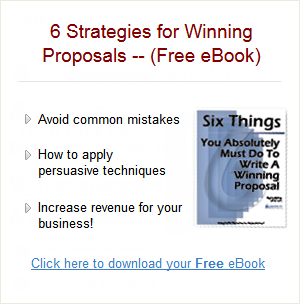Focus on What's Important in Your Proposal Sections
Here’s a question I get asked often:
“How do I figure out what to say in my sections when there is so much I could say? Where do I begin?”
The technical folks usually ask it. They are faced with an RFP requirement that is pretty vague, like “Describe your approach to Mission Control Software” or, even worse, “Mission Control Software” under a general heading of “System Specifications.” Furthermore, they are often given a tight page limit.
The problem is that the expert has a lot to say about the subject. She could go on and on about any topic in her field. And, left unchecked, she often will. The author is faced with a universe of data from which to choose as she decides what to write about. And what do you think she’ll do? She’ll likely write about that with which she is most familiar and comfortable-technical data with no real proposal focus.
That’s why technical sections are often so dense and irrelevant to the proposal.
Plus, the frustration of not knowing what to write will keep many authors from starting immediately. This is one of the biggest reasons authors procrastinate when it comes to writing the sections they have been assigned.
What’s the solution? It’s something you learned years ago, back in high school. Topic sentences. Remember topic sentences? They appear somewhere near the top of a paragraph, announcing what the rest of the paragraph (or set of paragraphs) will be about. As your English teacher told you, the topic sentence prepares the reader for what you are about to discuss.
What your English teacher also told you is that the topic sentence focuses the writer’s attention on what to say in the subsequent paragraphs. This is as true in proposals as it is in any other kind of writing. In fact, topic sentences are even more important in proposals because in proposals every word you write has to be focused on addressing the customer’s needs. Get off the track, and the reader will quit reading and will miss all that you have to offer.
But topic sentences don’t simply arise from the authors’ minds. They, too, have to be linked to something-and that’s where your strategy comes in. It’s critical that you have developed proposal themes, main messages that you want to send. It helps the authors develop topic sentences.
Say you have arrived at the following as one of your proposal themes:
“We offer the lowest risk technical solution to meet [the customer’s] needs.”
This gives focus to the author who is responsible for preparing the section on Mission Control Software. He can develop topics (and associated topic sentences) that show how your approach to MCS offers the lowest technical risk. Having that degree of focus limits the authors’ universe of potential things to say to a very manageable few things to say. This significantly reduces the potential amount of information he has to include in his section and increases the chances he’ll supply pertinent information. Plus, he’s more likely to get it in on time.
The lesson: Develop proposal themes and drive them down to your sections. Base your sections on the themes and you give your authors a better idea of where to start. And they’re likely to give you better input more quickly.

